We’ve speculated for quite some time that Android isn’t only for phones. While 2008 was all about the G1 and 2009 will likely see a slew of handsets, 2010 appears poised to see an Android Netbook. Scratch that… an Android Netbook already exists:
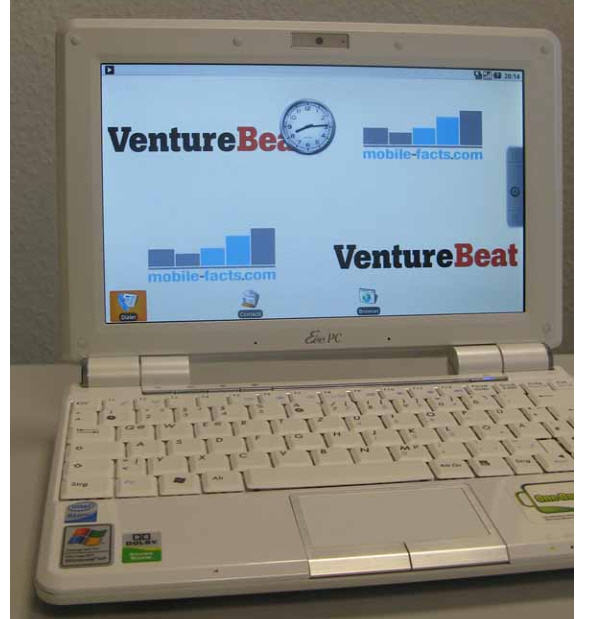
The above image is Android running on an Asus EEEPC. The folks at VentureBeat are responsible for compiling Android to the netbook and it only took 4 hours to complete. They were able to get web browsing, music playing, networking and more working smoothly… so it’s completely feasible that computer manufacturers could bring an Android Netbook to market sometime in 2009.
Why an Android Netbook?
Unless you’ve been hiding under a Palm Foleo somewhere, you would know that Netbooks aren’t just a little hype or up and coming possibility – the phenomenon has fully arrived. A quick look at Amazon’s Best Sellers in Computers shows that Netbooks are enjoying a huge portion of purchases thanks to their price and portability.
Google has yearned for a way to increase revenue outside of their contextual advertising found across the web. With mobile phones representing a HUGE growth sector, Android is a leg into a brand new market. But if Android can find itself mass distribution on Netbooks, with a growing market matching mobile, Google could do the Hokey Pokey and turn themselves around.
Do you think Chrome is a coincidence? In an unrelated article about the Google Chrome web browser which just came out of Beta, listen to what Sarah Perez from ReadWriteWeb has to say about it:
However, despite Chrome’s lack of features, its lightweight feel and speedy browsing have made it a popular choice as a Firefox alternative for light web surfing…especially the kind done on a netbook while killing time at Starbucks.
HTC executives have said that their Android based T-Mobile G1 handset is already eating into sales of Windows Mobile devices. With an Android Netbook, you can be sure that Google will start chomping into the market share of Windows and other PC software. Google Docs, anyone?
Put Android on a netbook, add Google’s suite of apps like Spreadsheets, Documents, Presentations, Reader, Mail and more. Then give it the quickest and most functional web browser on the planet. Provide all that for free and slap it on your favorite netbook. Offer Android Market for Netbooks so that users can download – for FREE – useful and relevant applications that improve their capabilities and inherently, lives.
There it is… the Android Netbook. A killer computing system where you pay a minimal amount for the hardware and are automatically plugged into some of the most powerful software on the planet… for free.
One problem Google Android could run into with this is the “fragmentation” which Google’s Open Source OS hoped to avoid completely by creating ONE operating system for ALL devices. Some level of fragmentation is inevitable, but Google has already shown their determination to plan for this in the Android Market.
Currently, Android Developers can choose to target specific countries with their applications, ensuring it doesn’t appear to those who don’t/can’t use it. It’s also in their best interest to target appropriately – if you there is an application about Bike Riding in France published in French to those stateside, the app is likely to get crushed with terrible ratings and others, even those would would enjoy the application, would be reluctant to download the poorly rated app.
Have an application developed specifically for netbooks? Go ahead and check Netbooks and uncheck Phones as you prepare to launch your application in the market and the problem is solved. This is, of course, assuming the app is only targeted to Netbook users. Mostly all of the applications on the market should work just fine on Netbooks.
Following up their piece on Android Netbooks, VentureBeat received a flurry of emails with questions about the possitibilities and potential, publishing answers to the most frequent answers with an Android Netbook FAQ. Here are the summarized answers:
- Could Android Run on laptops or PCs? Yes, and Google’s work on NativeClient seems to illustrate some sort of ambition to do so.
- Are laptops incredibly more complex than netbooks, hardware-wise? Nope, not at all.
- How far are we from an Android Netbook or Google OS for computers? We probably won’t see anything specific until 2010 but a manufacturer could – HYPOTHETICALLY – release something as soon as a few months. (This probably won’t happen and we would assume Google and the OHA want to take 2009 to start reaching widespread exposure in the mobile phone market)
Another interseting thing to note is that while the Mobile Android OS relies on the active participation of Wireless Carriers, Android Netbooks remove that process which has proved to be tedious. The removal of this hurdle gives me hope that sometime in 2009 we’ll at least be hearing more about an Android Netbook.



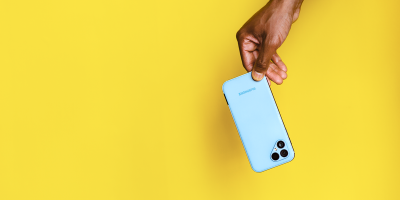


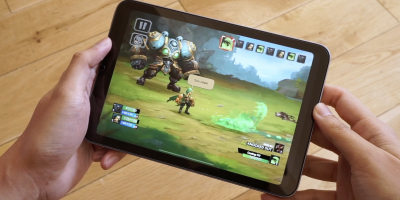
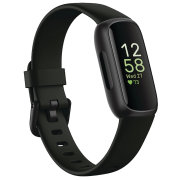
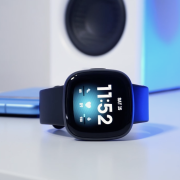
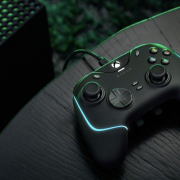

“Put Android on a netbook, add Google’s suite of apps like Spreadsheets, Documents, Presentations, Reader, Mail and more.”
And that’s the key. Android has some missing functionality from its support of Google Apps (and one or two other things), and in order for me to consider it a viable netbook/laptop/desktop platform, those would have to be addressed. Specifically:
1) Google Reader – add/edit tags for an article, add subscriptions, change subscription settings. Also, there are some “UI shortcomings” on the Android version: lack of shortcuts, lack of “total article count” at the top of the article list.
2) Gmail – add/edit filters and labels, “filter messages like this”, “send as” one of my other registered email addresses.
3) Google Docs – last I checked, Android doesn’t support full read/write of Google Docs. I’m also not sure if it will fully display PDFs, Word, and Excel documents. What I would want is all of that, plus some ability to sync the various Android notes and tasks/to-do lists into some level of Google App (there’s a new tasks/todo feature in Gmail or Google Calendar, so that’s one option, and then just adding plain text and rich text support to Google Docs would probably handle the rest, along with a sync utility for the Android notepad and todo apps).
4) I haven’t been able to get VNC Viewer and SSH (connectbot) to work together. This would be a “novelty” on my phone, but a necessity on a netbook or tablet. Further, on a netbook, I’m going to want to export my display some how (manipulate the netbook from my desktop) — I do this on my Samsung Q1 Ultra with Ubuntu-UMPC, for example. But I mainly run the VNC server on my samsung because the software for mirroring the display out to the external VGA port is kind of broken (what it does: want to step down to 800×600 resolution; what it should do: display the 1024×600 screen with letter boxing on the 1024×768 screen).
5) The built-in IM client doesn’t allow you to use non-Google Jabber accounts, nor IRC. I would want both of those handled. And I’m not sure the UI is ideal for managing multiple conversations. Further, I would want to be able to log conversations to plain text files on an SD card or something.
6) SyncML client for Calendar data. Funambol gives you SyncML client for contacts, but that doesn’t help me with my work calendar server :-)
As an interesting note, Freescale is saying they’re going to make ARM based netbooks. So you don’t necessarily even need to further develop the x86 version of Android in order to make this a reality.
Here’s what I’d want to see, hardware wise:
A convertible/tablet netbook that can fit comfortably in my gadget bag (say, about the same size as a Everun Digital Note), 1 or 2 USB Host/OTG ports, 1GB RAM, options for 8, 16, 32, or 64GB solid state storage, an SDHC card slot or two, wifi, BT (with support for at least DUN, PAN, FTP, HID, and BIP), internal PCI Express Mini card slot (with antenna wire available for those who decide to put in a WWAN card), USB Client for mass storage mode and charging, 8 hours battery life, portrait camera with flash and video capabilities (I don’t care either way about a chat camera), DVI-I display port (or, possibly, Apple’s new display port), internal microphone and external mic jack, 3.5mm headset jack (and built in speakers, of course), accelerometers for detecting screen orientation and movement when in tablet mode, Dpad and utility buttons (home, menu, “back/undo”, dunno if you’d need the green button, but I think you need the red one for power/sleep/screen-saver) on the sides of the screen.
I’d buy one of those.